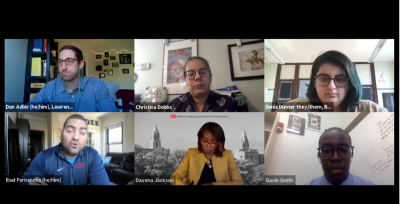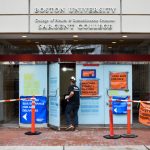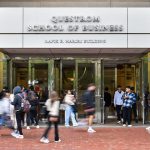Racism has been embedded in the history of the United States for centuries, but even as the country continues to grapple with racial injustice, education systems can neglect these difficult conversations entirely.

To address these deeply rooted issues, Boston University’s Wheelock College of Education and Human Development organized a collaborative Zoom meeting Thursday entitled, “Meeting the Moment: Teaching During Periods of Social Change.” BU professors and local Boston teachers discussed the changes within their classrooms during this time of racial unrest.
Gavin Smith, associate head of school at Fenway High School, spoke at the event about the way his ancestral background affected his outlook on education.
“I am from a plantation town in Jamaica known as Appleton … where the descendants of my family, about three generations back, were slaves,” Smith said during the panel. “The historical context of all of that has led my family down a path where we view education as the ultimate tool, the great equalizer.”
As an educator, Smith said, his role in education is to “empower students” and lend them a voice. Having more diverse people in the field of education, Smith said, makes generating impactful change more likely.
In terms of incorporating race and ethnicity into classroom discussions, Christina Dobbs, an assistant professor at Wheelock, said in an interview that an understanding of one’s own race is crucial for younger children who are just entering the education system.
“Racial identity development is part of what you’re going through in adolescence, and so I think having spaces where people can work through that’s important,” Dobbs said. “Making sure that as that work is being done, no harm is happening to the kids of color in the classroom is important.”
Establishing a safe place for students to speak on issues of race is personal to Dunia Dunner, 2019 Wheelock graduate and a fourth-grade teacher at Michael J. Perkins Elementary School.
Dunner said while growing up, they faced racism from their teachers. When 9/11 happened, a white teacher told then-second-grader Dunner, who is Iraqi, to stand outside the hall during moments of silence and later said to the class that people like their family committed a great tragedy to the country.
While Dunner said they remember that incident as one of many other negative interactions at school, it didn’t stop them from pursuing a career in education and eventually becoming a teacher themself.
“All I wanted was to be able to be the person for students where they feel safe enough to express themselves and to learn, no matter their racial, ethnic, learning profile,” Dunner said. “Whatever they come to me with … I try to create a safe place for them, and that’s one of the many reasons why I became a teacher.”
Dunner said people should confront their personal biases, acknowledge their privileges and be careful of what they’re saying, because “harmless little jokes” can set an example for kids.
Many residents of Quincy, where Dunner grew up, were discriminatory toward the East Asian people who live there — their own family displayed biases and made jokes, they said.
“When I was a kid I would laugh along because … I didn’t know any better,” Dunner said. “As soon as I got to high school and I grew up and I became an adult, I was like ‘Whoa, those jokes weren’t funny, they were racist.’”
Davena Jackson, an assistant professor at Wheelock, has conducted research on anti-Blackness. She said during the discussion that when classrooms take on the representation of Black and Brown students, they often do so in a harmful way.
“Why aren’t we putting voices in the classroom, works in the classroom, where students can say, ‘Wow, I see me?’” Jackson said.
Dunner also said diversifying in-class readings is important because literature allows students to look into different cultures and understand other perspectives. They said in an interview books serve as windows, mirrors and doors.
“You want to have books that allow students to have a window that look out into other people’s lives,” Dunner said.” You want to have books that allow them to look back at themselves and see themselves represented in literature. And you want to have doors where students are able to step into a book and just fall into the world.”
Moving forward, Dunner said teachers should do less of raising voices against one another, and more of listening to one another. This, they said, is the first step to meeting the moment.
“As a society, we spend a lot of time talking,” Dunner said. “You need to shut up and listen. You need to listen to the stories of the people who live the marginalization and the racism and the prejudice and the harm every single day and the trauma every single day.”
Nancy Jiang contributed to the reporting of this article.














